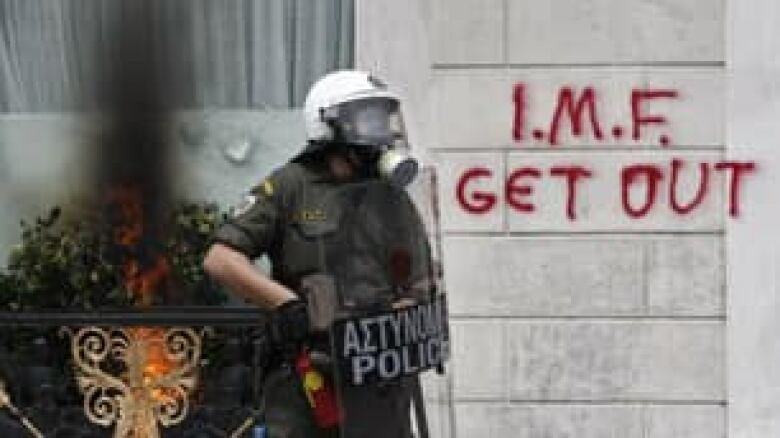Greek protest fire kills 3
Prime minister denounces violent protests
Protests against proposed spending cuts by the Greek government turned violent Wednesday, as demonstrators clashed with riot police and torched buildings, killing at least three people.
The three people died after they were trapped in a bank building in Athens that was set ablaze, fire officials said.
Prime Minister George Papandreou denounced the violence and said the people responsible for the deaths would be brought to justice, telling parliament that "a demonstration is one thing and murder is quite another."
Thousands of protesters took to the streets Wednesday in a general strike to protest harsh austerity measures aimed at saving the country from bankruptcy.

Most of the demonstrations were peaceful, but some groups attacked government offices and commercial buildings, provoking clashes with riot police, said the CBC's Margaret Evans from Athens.
One group of protesters tried to storm parliament, hurling paving stones and Molotov cocktails at police, who responded with tear gas.
"Some parts of the demonstration did turn violent," Evans said from Athens. "You can smell the tear gas still lingering in the air."
The general strike paralyzed the country's transportation system as transport workers walked off the job, leaving planes, trains and ferries sitting idle. A large number of schools, hospitals and businesses were also closed.
The transport workers joined thousands of civil servants who had launched their own strike Tuesday.
The protesters are lashing out against a government plan to impose a number of austerity measures — including cuts to pensions, wage freezes and tax increases — to qualify for a $147-billion rescue package of loans from the International Monetary Fund and the euro countries.
The bill is set to be voted into law by the end of the week.
Papandreou's Socialists hold a comfortable majority of 160 in the 300-seat parliament. With a simple majority of 151 votes needed, the bill is expected to pass easily.
'Fork in the road,' Merkel says
German Chancellor Angela Merkel urged parliament to approve the bailout, calling the loan package critical for all of Europe.

"Nothing less than the future of Europe, and with that the future of Germany in Europe, is at stake," Merkel said in Berlin. "We are at a fork in the road."
Axel Weber, a member of the European Central Bank's governing council and head of Germany's Bundesbank, warned lawmakers that the financial problems afflicting Greece pose a serious risk of infecting other countries in the eurozone.
There is "a serious threat of contagion effects for other eurozone countries" that could further roil already jittery markets, he told the German parliament's budget committee.
Speaking in Brussels Wednesday, Prime Minister Stephen Harper said that European countries have taken the steps that are needed to deal with the economic crisis in Greece, saying he expects to see more "positive reaction" in markets as the plan moves forward.
"These are very large actions and they're sufficient to deal with the problem and we are very supportive of our European partners," he said.
With hundreds of billions in debt and a budget deficit of 13.6 per cent of gross domestic product, Greece has been struggling to put its finances in order. It was less than three weeks away from defaulting when the euro zone finance ministers agreed Sunday to activate the rescue.
Athens needs to see the first instalment of funds before May 19, when it has more than $11 billion worth of bonds due.
With files from The Associated Press